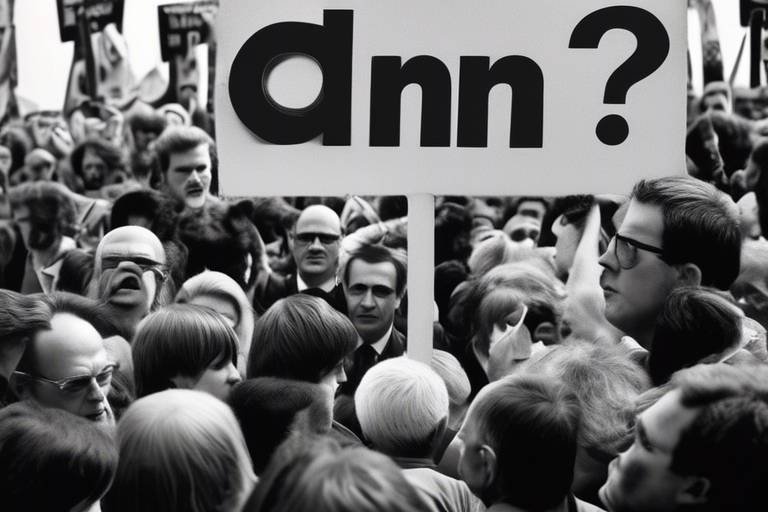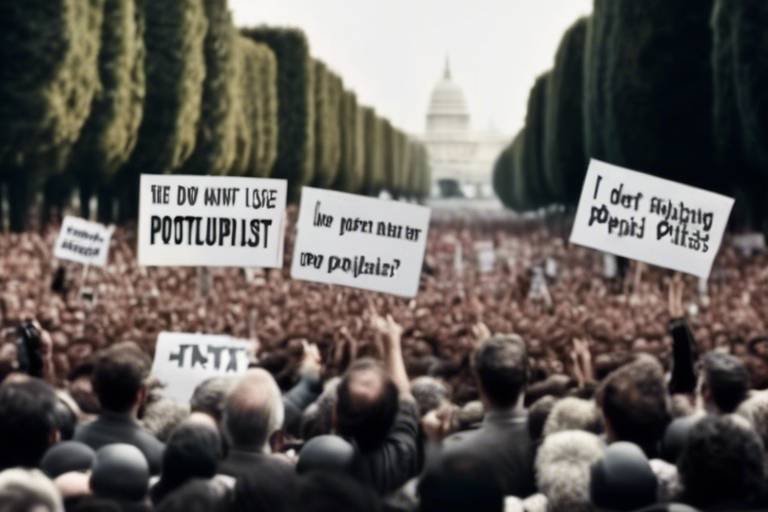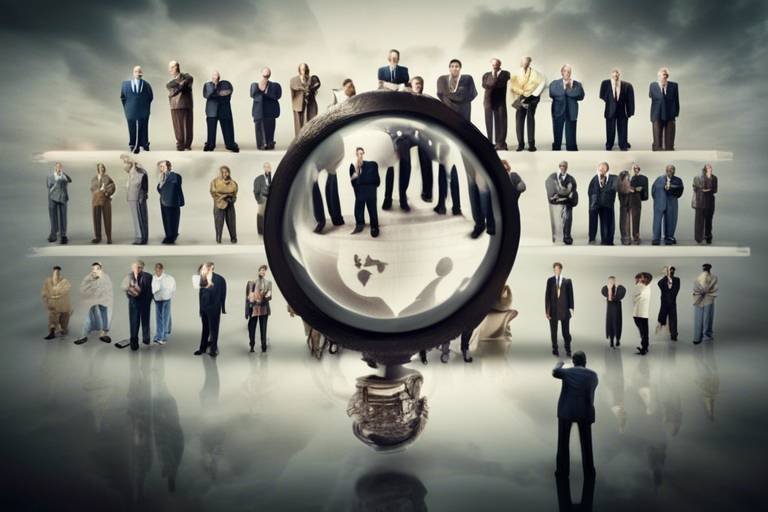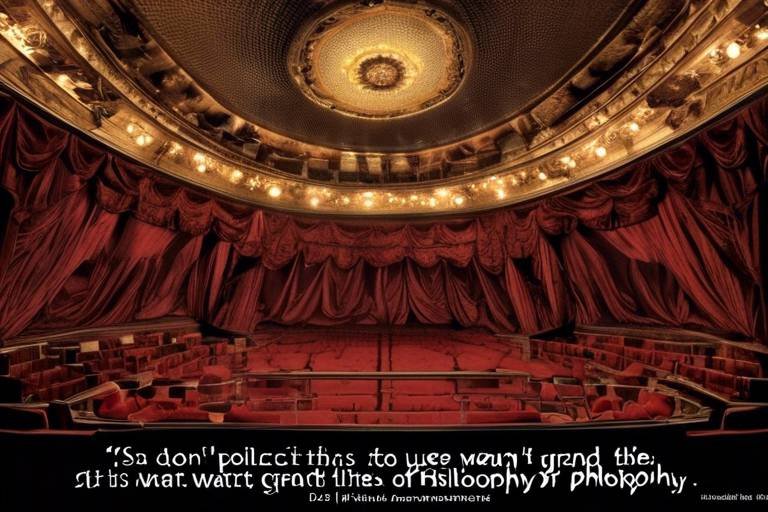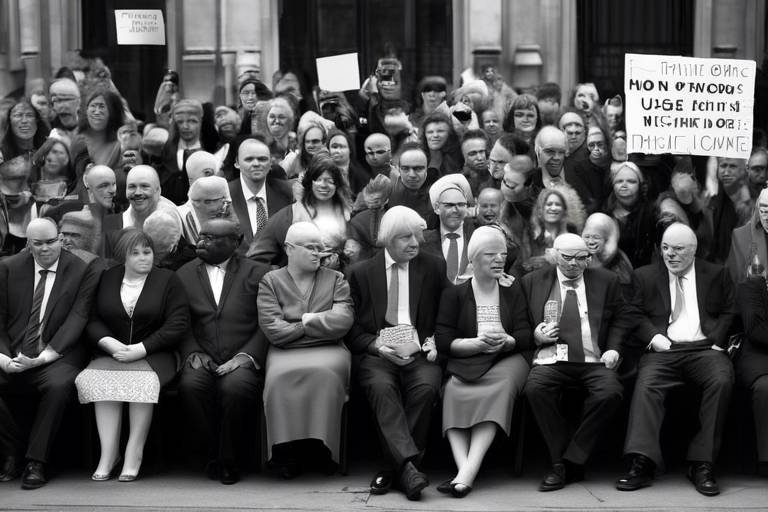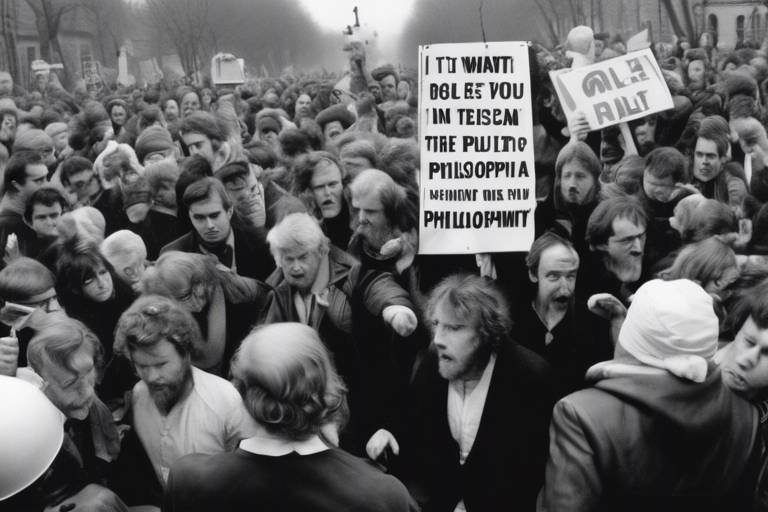Deconstructing the Political Philosophy of Thomas Jefferson
Thomas Jefferson, a founding father and the third president of the United States, is often celebrated for his profound contributions to American political thought. His political philosophy is a tapestry woven from threads of Enlightenment ideals, a deep commitment to individual rights, and a vision for a government that serves the people. Jefferson believed that democracy was not just a system of governance but a fundamental expression of human dignity and freedom. In this article, we will explore the intricate layers of Jefferson's political philosophy, examining his views on democracy, individual rights, and the role of government, while also considering his lasting impact on American political thought.
At the heart of Jefferson's vision for democracy is the concept of popular sovereignty. He argued that the legitimacy of government stems from the consent of the governed. This idea was revolutionary at the time, as it challenged the traditional notions of monarchy and aristocracy. Jefferson believed that a true democracy is one where the people actively participate in governance, shaping the laws and policies that affect their lives. He famously stated, “The government that governs least governs best,” reflecting his belief in minimal government intervention in the lives of citizens. This foundational principle laid the groundwork for American democratic ideals, emphasizing the importance of individual rights and the need for a government that is accountable to its people.
Central to Jefferson's philosophy is the belief in natural rights. He posited that certain rights are inherent to all individuals and cannot be surrendered or transferred. This belief is eloquently articulated in the Declaration of Independence, a document he authored, which proclaims that all men are created equal and endowed with unalienable rights, including life, liberty, and the pursuit of happiness. Jefferson's views on individual liberties not only shaped the Declaration but also influenced the development of civil rights in America. He envisioned a society where individuals are free to express themselves, practice their beliefs, and pursue their aspirations without undue interference from the government.
The Declaration of Independence is a cornerstone of American democracy, and its philosophical underpinnings reflect Jefferson's deep commitment to individual rights. In this document, he articulates the fundamental rights of individuals and the moral justification for rebellion against tyranny. The Declaration served as a rallying cry for the colonies, encapsulating the revolutionary spirit of the time. It inspired countless movements for freedom and equality around the globe, establishing Jefferson as a pivotal figure in the discourse of human rights.
Jefferson's ideas were pivotal during the American Revolution. His philosophy not only inspired revolutionary sentiments but also galvanized support for independence among the colonies. By advocating for the rights of individuals and the necessity of a government that respects those rights, Jefferson helped to forge a national identity rooted in liberty and justice. His writings encouraged ordinary citizens to envision a future free from oppression, making him a key player in the American quest for independence.
Even today, Jefferson's principles continue to resonate in contemporary democratic discourse. His thoughts on individual rights inform current debates about freedom and government intervention. As we navigate complex issues such as privacy rights, freedom of speech, and the role of government in our lives, Jefferson's insights remind us of the importance of protecting individual liberties while ensuring that the government remains accountable to its citizens.
Jefferson believed in a limited government that exists primarily to protect individual rights. He was skeptical of centralized authority, fearing that it could lead to tyranny and oppression. In his view, government should act as a guardian of freedom rather than a master of the people. This belief in a balanced approach to governance is crucial in understanding Jefferson's political philosophy. He advocated for a system of checks and balances, ensuring that no single entity could wield unchecked power.
Education was a cornerstone of Jefferson's vision for an informed citizenry. He recognized that a well-educated populace is essential for the functioning of a healthy democracy. Jefferson championed public education, believing that it empowers citizens to make informed decisions and participate actively in governance. His advocacy for educational reforms laid the groundwork for the public education system we know today.
Jefferson's proposals for public education were groundbreaking. He argued for the establishment of free public schools to ensure that every child, regardless of their background, had access to education. This initiative was not just about individual advancement; it was about fostering a sense of civic responsibility and promoting informed participation in democracy. Jefferson understood that an educated citizenry is vital for the preservation of liberty and the health of the republic.
The Enlightenment profoundly shaped Jefferson's political philosophy. Influenced by key thinkers such as John Locke and Montesquieu, Jefferson embraced the ideas of reason, progress, and individualism. These concepts are reflected in his writings, where he argues for the application of reason to both governance and personal conduct. Jefferson's belief in the power of human reason to improve society is a testament to the enduring legacy of Enlightenment thought in shaping modern democratic ideals.
- What were Jefferson's views on democracy?
Jefferson believed in a democracy that emphasizes individual rights and popular sovereignty, where the government is accountable to the people. - How did Jefferson influence the Declaration of Independence?
Jefferson authored the Declaration, articulating the fundamental rights of individuals and the moral justification for rebellion against tyranny. - What role did education play in Jefferson's philosophy?
Jefferson championed public education as essential for an informed citizenry, believing it empowers individuals to participate actively in democracy. - How does Jefferson's legacy impact modern democracy?
Jefferson's principles on individual rights continue to inform contemporary debates about freedom, government intervention, and civil liberties.
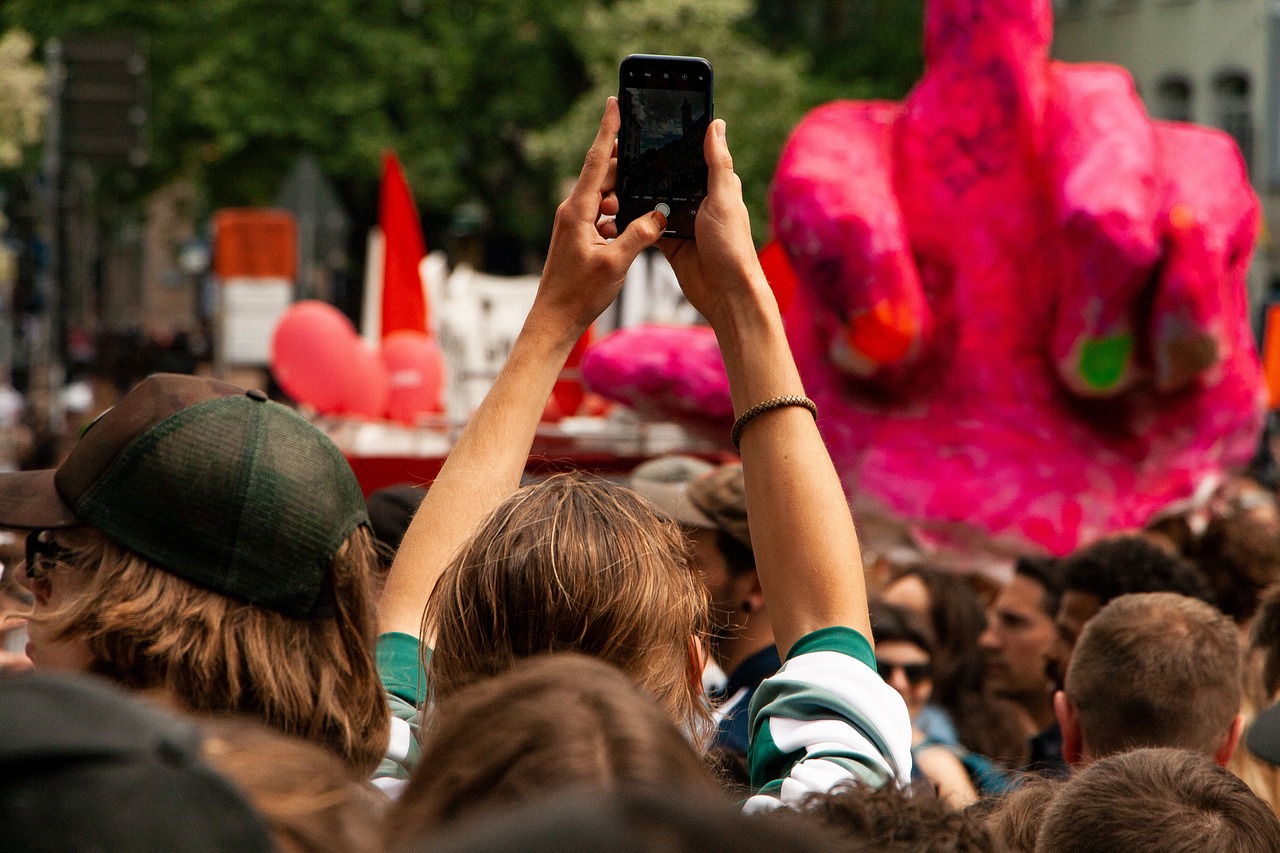
The Foundations of Jeffersonian Democracy
Thomas Jefferson's vision of democracy was not just a fleeting idea; it was a profound framework that reshaped the very fabric of American society. At the heart of Jeffersonian democracy is the unwavering belief in individual rights and the concept of popular sovereignty. Jefferson envisioned a system where the government derives its power from the consent of the governed, which was revolutionary at the time and remains a cornerstone of democratic thought today.
One of the most striking aspects of Jefferson's philosophy is his emphasis on the importance of the common man. He believed that every citizen, regardless of their social status or wealth, should have a voice in the political process. This idea was radical, as it challenged the prevailing notion that only the elite were fit to govern. Jefferson argued that a well-informed populace was essential for the health of democracy, suggesting that education and civic responsibility go hand in hand. In his view, democracy should not be a privilege reserved for a select few but a right accessible to all.
To better understand the foundations of Jeffersonian democracy, we can break down its core tenets:
- Natural Rights: Jefferson believed that certain rights, such as life, liberty, and the pursuit of happiness, are inherent to every individual and cannot be taken away by the government.
- Popular Sovereignty: The government exists to serve the people, and its legitimacy comes from the consent of the governed.
- Limited Government: Jefferson advocated for a government that is restricted in its powers, ensuring that it does not infringe upon individual liberties.
- Civic Engagement: He championed the idea that an informed and active citizenry is vital for a functioning democracy.
Jefferson's belief in the importance of individual rights laid the groundwork for the Bill of Rights, which further enshrined these liberties into American law. His influence can be seen in the way that these principles have been interpreted and reinterpreted throughout American history. The resonance of his ideas is evident in various social movements, from the abolitionist movement to the civil rights movement, where the fight for equality and justice echoes Jefferson's call for individual rights.
Moreover, Jefferson’s skepticism of centralized authority is a critical aspect of his political philosophy. He feared that too much power concentrated in a single entity could lead to tyranny, which is why he advocated for a decentralized government structure. This belief in a limited government that prioritizes individual freedoms has been a guiding principle in American political discourse, influencing everything from local governance to national policies.
In summary, the foundations of Jeffersonian democracy are built upon the pillars of individual rights, popular sovereignty, and limited government. These principles not only shaped the early American political landscape but continue to inform contemporary discussions about democracy and governance. Jefferson’s legacy is a testament to the enduring power of these ideas, reminding us that democracy is not merely a system of government, but a way of life that values the individual and their rights above all.
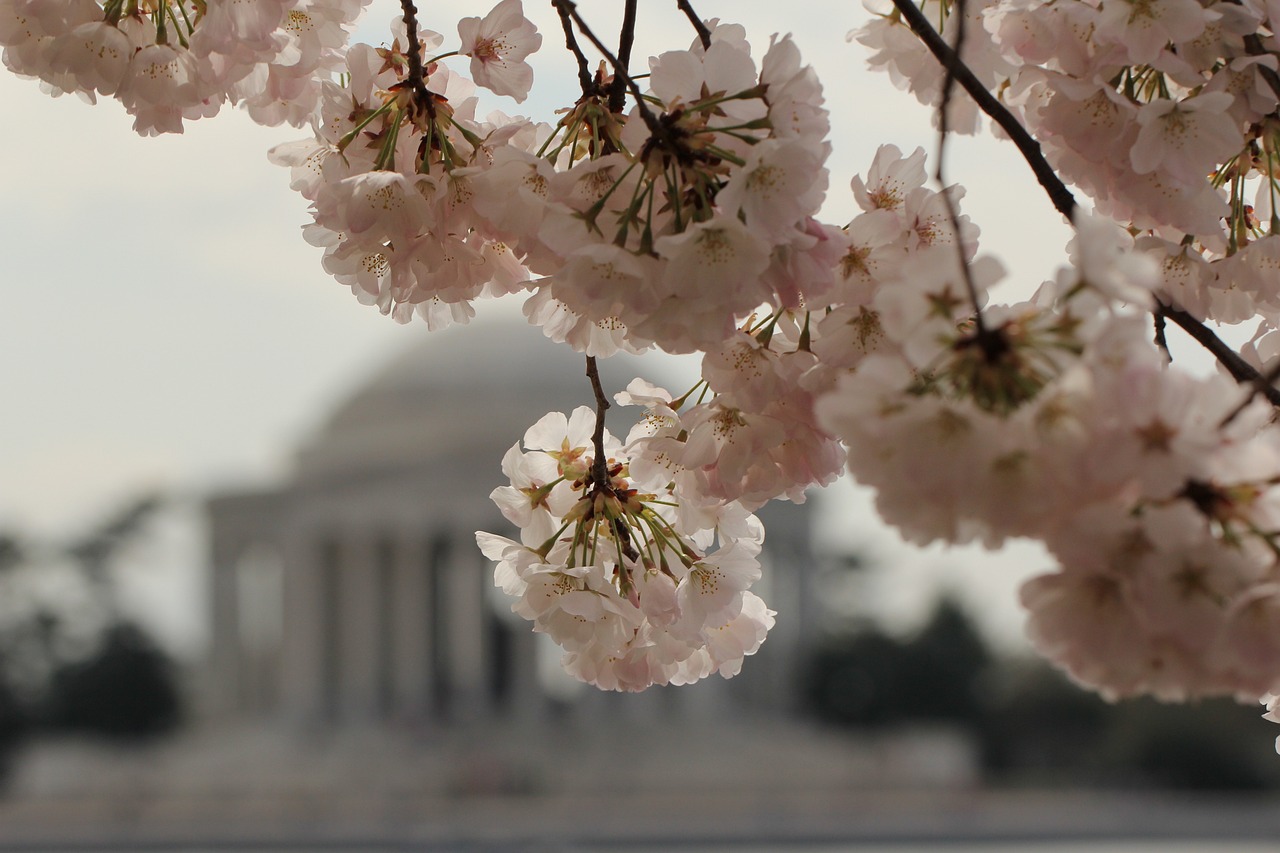
Individual Rights and Liberties
At the heart of Thomas Jefferson's political philosophy lies a profound commitment to individual rights and liberties. Jefferson believed that every person is endowed with certain natural rights that are inalienable and must be protected by the government. This belief is beautifully encapsulated in the phrase “life, liberty, and the pursuit of happiness” found in the Declaration of Independence. Jefferson's insistence on individual rights was revolutionary for his time and laid the groundwork for future civil rights movements in the United States.
Jefferson's views on individual liberties were not just theoretical; they were deeply practical and reflected in his actions. He argued that a government derives its power from the consent of the governed, which means that it has a duty to protect the rights of its citizens. This idea of popular sovereignty was radical and set the stage for a new understanding of citizenship and governance. Jefferson envisioned a society where individuals could freely express their thoughts, practice their religions, and pursue their ambitions without undue interference from the state.
To better understand Jefferson's views on individual rights, consider the following key aspects:
| Aspect | Description |
|---|---|
| Natural Rights | Rights inherent to all individuals that cannot be taken away. |
| Role of Government | To protect the rights of individuals and ensure their freedoms. |
| Popular Sovereignty | The idea that government power comes from the consent of the governed. |
Jefferson's belief in individual rights was not merely a philosophical stance; it had real-world implications. His ideas inspired many to fight for their rights and seek justice in a society that often overlooked the marginalized. The abolitionist movement, for example, drew heavily on Jeffersonian principles, arguing that slavery was a violation of the natural rights Jefferson espoused. Similarly, movements for women's suffrage and civil rights would later echo Jefferson's insistence on equality and freedom.
Moreover, Jefferson's writings and public speeches often emphasized the importance of civil liberties. He maintained that a well-informed citizenry was essential for the preservation of democracy. In his view, education was not just a tool for personal advancement but a means to empower individuals to safeguard their rights and hold their government accountable. Jefferson famously stated, “If a nation expects to be ignorant and free, in a state of civilization, it expects what never was and never will be.” This statement underscores his belief that an educated populace is crucial for the protection of individual liberties.
In the modern context, Jefferson's views on individual rights continue to resonate. Debates surrounding issues like freedom of speech, privacy rights, and government surveillance often hark back to the foundational principles he championed. As we navigate the complexities of contemporary society, Jefferson's insistence on protecting individual liberties serves as a reminder of the ongoing struggle to uphold these rights against encroachments from both government and societal norms.
- What are individual rights according to Jefferson?
Individual rights are the fundamental liberties that every person possesses, which include life, liberty, and the pursuit of happiness. - How did Jefferson's ideas influence civil rights movements?
Jefferson's advocacy for natural rights provided a philosophical foundation for various civil rights movements, inspiring activists to demand equality and justice. - Why is education important in Jefferson's philosophy?
Jefferson believed that education was crucial for empowering citizens to understand and defend their rights, thus ensuring a healthy democracy.
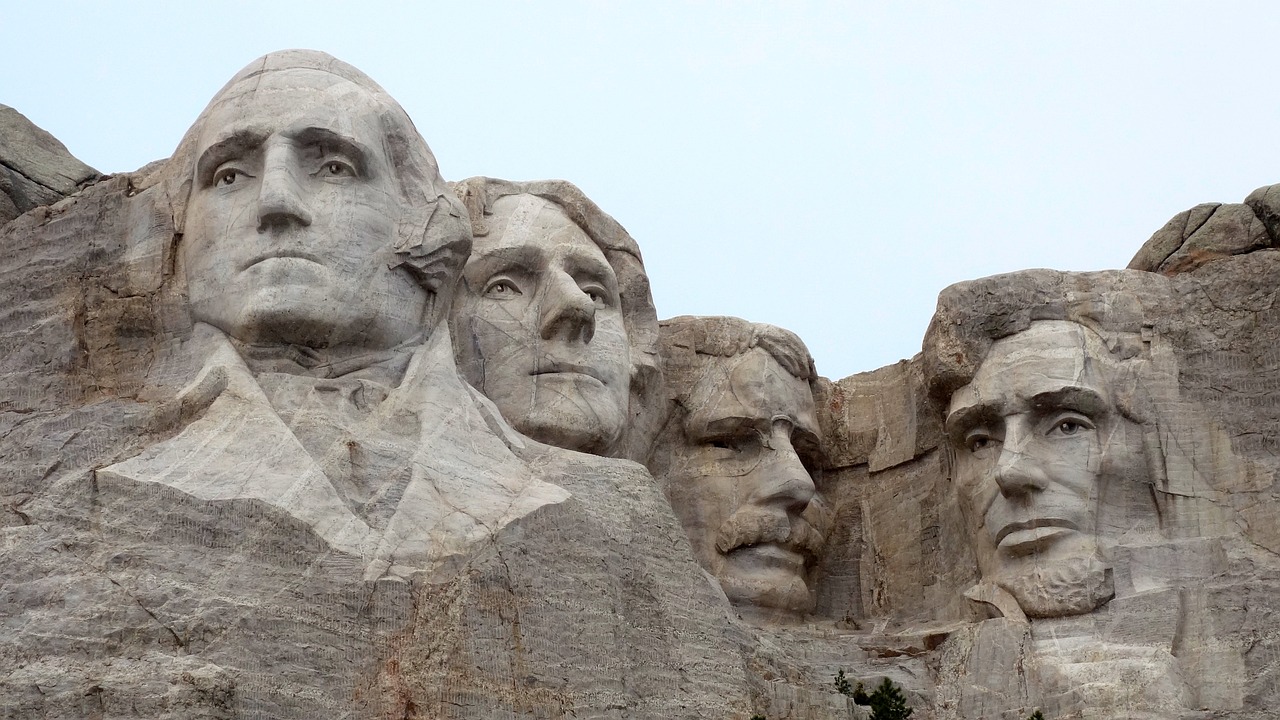
The Declaration of Independence
The Declaration of Independence is not just a historical document; it's a profound declaration of human rights and a manifesto of freedom. Authored by Thomas Jefferson in 1776, this text encapsulates the essence of what it means to be an American. It boldly asserts that all men are created equal and endowed with certain unalienable rights, including life, liberty, and the pursuit of happiness. These words resonate through time, echoing the universal desire for freedom and justice.
At the heart of the Declaration is the philosophy of natural rights, which Jefferson borrowed from Enlightenment thinkers like John Locke. Jefferson argued that governments are instituted to secure these rights, deriving their just powers from the consent of the governed. This radical idea challenged the traditional notions of monarchy and divine right, positioning the people as the ultimate authority. It raises a crucial question: if a government fails to protect these rights, do the people not have the right to alter or abolish it? This concept not only fueled the American Revolution but also laid the groundwork for modern democratic thought.
The Declaration is structured around a series of grievances against King George III, which serve to justify the colonies' break from British rule. Jefferson meticulously lists these grievances, highlighting the injustices faced by the colonists. Some of the key complaints include:
- Imposing taxes without consent
- Dissolving legislative bodies
- Depriving colonists of trial by jury
- Maintaining standing armies in peacetime
These grievances were not mere complaints; they were a rallying cry that united the colonies in their quest for independence. Jefferson's eloquent prose painted a picture of tyranny that was both specific and relatable, allowing colonists to see their struggles reflected in the text. This document became a symbol of hope and a call to arms, igniting revolutionary fervor across the thirteen colonies.
Moreover, the Declaration of Independence transcended its immediate context. It inspired countless movements for freedom and equality around the globe. From the French Revolution to contemporary struggles for civil rights, Jefferson's words have served as a beacon of hope for those seeking justice. The Declaration has become a foundational text, influencing not only American identity but also the global discourse on human rights.
In the modern era, the principles laid out in the Declaration continue to spark debates about freedom and government intervention. As society grapples with issues like surveillance, social justice, and individual liberties, Jefferson's assertion that "governments are instituted among men" remains a powerful reminder of the delicate balance between authority and freedom. His vision of a government that protects individual rights while remaining limited in scope is a conversation that is as relevant today as it was in the 18th century.
In conclusion, the Declaration of Independence is more than just a document; it is a living testament to the enduring values of democracy, equality, and human rights. Jefferson's masterful articulation of these ideas not only shaped the course of American history but also left an indelible mark on the world. As we reflect on its significance, we are reminded of the ongoing struggle for freedom and the importance of safeguarding the rights that Jefferson so passionately defended.
- What was the main purpose of the Declaration of Independence?
The main purpose was to declare the colonies' independence from British rule and to outline the principles of individual rights and government accountability. - Who wrote the Declaration of Independence?
Thomas Jefferson was the principal author, with contributions from other members of the Continental Congress. - How did the Declaration influence other countries?
It inspired various movements for independence and human rights around the world, such as the French Revolution and civil rights movements.

Influence on Revolutionary Ideas
Thomas Jefferson's political philosophy was not just a collection of ideas; it was a powerful catalyst that ignited the flames of revolution in the American colonies. His writings and beliefs provided a framework for the colonists to articulate their grievances against British rule. Imagine a world where the very essence of freedom was being challenged, and Jefferson emerged as the voice of reason, urging individuals to stand up for their rights. His assertion that "all men are created equal" resonated deeply, becoming a rallying cry for those seeking independence.
One of the most profound influences of Jefferson's philosophy was his unwavering belief in the concept of natural rights. He argued that certain rights were inherent to all individuals, granted by nature and not by any government. This notion played a crucial role in shaping the revolutionary sentiment, as it provided a moral justification for breaking away from British authority. Jefferson's emphasis on life, liberty, and the pursuit of happiness became the cornerstone of the American identity. In this way, Jefferson's ideas not only inspired the revolution but also helped define what it meant to be an American.
Furthermore, Jefferson's vision of a government that derives its power from the consent of the governed was revolutionary in itself. This principle challenged the long-standing notion of monarchy and divine right, advocating instead for a system where the people had a voice. The Declaration of Independence, with its eloquent articulation of these ideas, served as a blueprint for the revolutionaries. It encouraged them to envision a new society where freedom and equality were paramount.
To illustrate the impact of Jefferson's ideas on the revolutionary movement, consider the following key points:
- Mobilization of Public Sentiment: Jefferson's writings helped galvanize public opinion, encouraging ordinary citizens to participate in the fight for independence.
- Articulation of Grievances: His philosophical framework provided a means for revolutionaries to articulate their grievances against British rule, framing them as violations of natural rights.
- Inspiration for Future Leaders: Jefferson's ideas inspired not only his contemporaries but also future generations of leaders who would continue to champion the cause of liberty.
In essence, Jefferson's influence on revolutionary ideas was profound and far-reaching. His thoughts on individual rights and government by consent laid the groundwork for a new political order. As the colonies united in their struggle for independence, they drew upon Jefferson's philosophy to forge a path toward a democratic society, one that valued the rights of the individual above all. The echoes of his revolutionary spirit can still be felt today, reminding us of the power of ideas to change the course of history.
1. What were the key principles of Jefferson's political philosophy?
Jefferson's political philosophy centered around natural rights, individual liberties, and the belief in a government that is accountable to the people. He emphasized the importance of democracy and popular sovereignty.
2. How did Jefferson's ideas influence the Declaration of Independence?
Jefferson's belief in natural rights and the idea that government derives its power from the consent of the governed were central to the Declaration. His writings articulated the colonies' grievances and justified their quest for independence.
3. In what ways did Jefferson advocate for education?
Jefferson championed public education as a means to empower citizens and promote informed participation in democracy. He believed that an educated populace was essential for the functioning of a democratic society.
4. How do Jefferson's ideas resonate in modern democracy?
Jefferson's principles continue to influence contemporary discussions about individual rights, government intervention, and the role of citizens in a democracy. His legacy serves as a reminder of the ongoing struggle for freedom and equality.
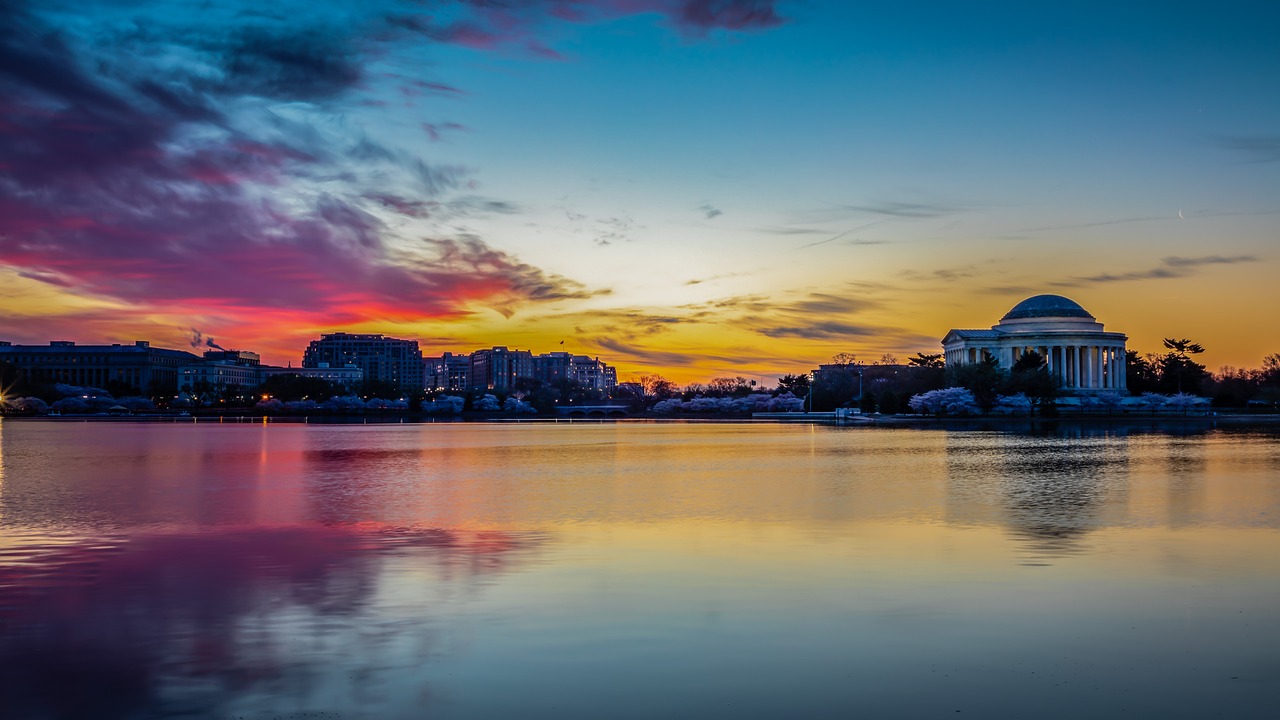
Legacy in Modern Democracy
Thomas Jefferson's political philosophy has left an indelible mark on modern democracy, influencing not only the foundational principles of the United States but also the broader global discourse on individual rights and governance. His ideas resonate strongly in today's discussions about freedom, civil liberties, and the role of government in citizens' lives. Jefferson envisioned a society where the government is a servant of the people, a notion that remains a cornerstone of democratic thought.
One of the most profound aspects of Jefferson's legacy is his unwavering belief in the importance of individual rights. He argued that every person is entitled to certain inalienable rights, including life, liberty, and the pursuit of happiness. This assertion has become a rallying cry for various movements advocating for civil rights, equality, and social justice throughout history. For instance, the civil rights movement of the 1960s drew heavily on Jeffersonian ideals, emphasizing that government should not infringe upon the rights of individuals.
Furthermore, Jefferson's skepticism towards centralized authority continues to influence contemporary debates about government intervention. Many modern political theorists and activists advocate for a decentralized government structure that empowers local communities, echoing Jefferson's warnings against the potential tyranny of a strong central government. This perspective encourages a more participatory form of governance, where citizens are not just passive recipients of political decisions but active participants in shaping their communities.
In addition to his views on governance, Jefferson's emphasis on education as a pillar of democracy has had lasting implications. He believed that an educated populace is essential for the functioning of a healthy democracy. This belief has led to ongoing discussions about the importance of public education and access to knowledge as fundamental rights. Today, educational reform continues to be a hot topic, with advocates pushing for equitable access to quality education for all individuals, reinforcing Jefferson's vision of an informed citizenry capable of making sound decisions.
Moreover, Jefferson's ideas have transcended American borders, inspiring democratic movements around the world. His writings have been referenced in various declarations and constitutions, serving as a guiding light for those striving for freedom and self-governance. The Universal Declaration of Human Rights, adopted by the United Nations in 1948, reflects many of the principles Jefferson championed, showcasing the global reach of his philosophy.
In summary, Jefferson's legacy in modern democracy is characterized by a commitment to individual rights, a caution against centralized power, and an unwavering belief in the transformative power of education. As we navigate the complexities of contemporary governance, Jefferson's insights remain relevant, urging us to reflect on the balance between liberty and authority and the necessity of an informed and engaged citizenry.
- What are the core principles of Jeffersonian democracy? Jeffersonian democracy emphasizes individual rights, popular sovereignty, and the importance of education in creating an informed citizenry.
- How did Jefferson influence modern civil rights movements? Jefferson's assertion of inalienable rights has been a foundational argument for various civil rights movements, advocating for equality and justice.
- What was Jefferson's view on government power? Jefferson believed in a limited government that protects individual rights and cautioned against the dangers of centralized authority.
- How did Jefferson advocate for education? Jefferson championed public education as a means to empower citizens and promote civic responsibility, recognizing its vital role in a functioning democracy.

Role of Government
When we think about the role of government, the first thing that often comes to mind is power. But for Thomas Jefferson, government was more about protection than domination. He believed that the primary function of government should be to safeguard the individual rights of its citizens. Imagine a protective umbrella on a rainy day; it doesn’t create the rain, but it keeps you dry from its effects. In Jefferson's view, government should act similarly—shielding citizens from tyranny and injustice while allowing them the freedom to pursue their own happiness.
Jefferson was a staunch advocate for a limited government. He feared that a powerful centralized authority could lead to oppression, much like a wolf guarding the henhouse. This skepticism toward concentrated power was rooted in his belief that the best government is one that governs least. He famously stated, “That government is best which governs least.” This sentiment reflects his conviction that individuals are capable of managing their own lives and that too much government interference can stifle personal liberties.
To Jefferson, the ideal government was one that derived its power from the consent of the governed. He envisioned a system where the people had a direct say in their governance, which is why he championed the idea of popular sovereignty. This concept is akin to a ship where the crew has the right to steer the course. If the crew is unhappy with the direction, they should have the power to change it. Jefferson believed that regular elections and civic engagement were essential for ensuring that government remained accountable to the people.
However, it’s important to note that Jefferson did not advocate for anarchy. He recognized that some level of government is necessary to maintain order and protect the rights of individuals. He argued for a balance between liberty and security, suggesting that while individuals should enjoy extensive freedoms, there must be laws in place to prevent chaos. This delicate equilibrium is crucial for a functioning democracy, and Jefferson's insights continue to resonate in today's political discussions.
In summary, Jefferson's philosophy on the role of government emphasizes a protective and limited approach that prioritizes individual rights and popular consent. His ideas serve as a foundation for modern democratic principles, reminding us that while government is necessary, it should never overshadow the freedoms of the people it serves.
- What was Jefferson's view on government size? Jefferson believed in a limited government that should only intervene when necessary to protect individual rights.
- How did Jefferson's ideas influence modern democracy? His principles of individual rights and popular sovereignty continue to shape democratic discourse today.
- What is popular sovereignty? It is the principle that government derives its power from the consent of the governed, allowing citizens to have a direct say in their governance.
- Did Jefferson support any form of government intervention? Yes, while he advocated for limited government, he recognized the need for laws to maintain order and protect rights.

Education and Enlightenment
When we think about the political philosophy of Thomas Jefferson, we can't overlook the profound role that education played in shaping his views. Jefferson believed that an informed citizenry was the backbone of a healthy democracy. He famously stated, "If a nation expects to be ignorant and free, in a state of civilization, it expects what never was and never will be." This underscores his conviction that education is not just a privilege but a necessity for the survival of a democratic society.
Jefferson's advocacy for public education stemmed from his belief that knowledge empowers individuals to make informed decisions. He envisioned a society where every citizen had access to education, which would enable them to participate actively in governance. In his mind, education was a tool for enlightenment, fostering critical thinking and civic responsibility. He once proposed a system of public education that would ensure every child received at least three years of schooling. This was revolutionary for his time, as it aimed to break the cycle of ignorance that often perpetuated social inequalities.
Moreover, Jefferson was heavily influenced by the Enlightenment thinkers of his time, who championed reason, science, and intellectual exchange. Figures such as John Locke and Voltaire inspired him to see education as a means of personal and societal progress. Jefferson's writings reflect the Enlightenment ideals of rational thought and the belief that through education, individuals could improve themselves and, by extension, their communities. He viewed education as a catalyst for change, much like a spark igniting a fire of innovation and enlightenment.
In addition to advocating for public education, Jefferson also established the University of Virginia, which was a groundbreaking institution for higher education. He designed the university with the intention of creating a space where students could pursue knowledge freely, without the constraints of dogma or tradition. This vision was rooted in the Enlightenment belief that knowledge should be accessible, and that education should encourage independent thought. Jefferson’s commitment to education and enlightenment was not just about individual advancement; it was about cultivating a society where citizens could engage critically with their government and hold it accountable.
As we reflect on Jefferson's legacy, it becomes clear that his emphasis on education remains relevant today. In an age where misinformation can spread rapidly, the need for an educated populace is more critical than ever. Jefferson's ideals remind us that education is a lifelong journey, one that empowers individuals to challenge the status quo and advocate for their rights. Just as he believed in the transformative power of knowledge, we too must champion education as a fundamental right, ensuring that future generations are equipped to navigate the complexities of democracy.
- Why did Jefferson prioritize education? Jefferson believed that education was essential for a functioning democracy, as it empowered citizens to make informed decisions and engage in governance.
- What impact did Enlightenment thinkers have on Jefferson? Enlightenment thinkers like John Locke and Voltaire influenced Jefferson’s views on reason, knowledge, and the importance of an educated citizenry.
- How did Jefferson contribute to public education? Jefferson proposed a public education system and founded the University of Virginia, emphasizing the need for accessible education for all citizens.
- What is the relevance of Jefferson's educational philosophy today? Jefferson's emphasis on education as a means of empowerment and civic engagement continues to resonate in contemporary discussions about education access and quality.

Public Education Initiatives
Thomas Jefferson was a firm believer in the transformative power of education. He understood that an informed citizenry is the backbone of a healthy democracy. Jefferson's vision for public education was not just about imparting knowledge; it was about empowering individuals to think critically, participate actively, and contribute to the greater good of society. He famously stated, "Enlighten the people generally, and tyranny and oppression of body and mind will vanish like evil spirits at the dawn of day." This quote encapsulates his belief that education is the key to liberty and self-governance.
In the early 1800s, Jefferson proposed a system of public education that aimed to provide free education for all children, regardless of their background. He argued that education should be accessible to every citizen, as it would cultivate a sense of civic responsibility and promote the common good. Jefferson's ideas were revolutionary for his time, and they laid the groundwork for the public education systems we see in America today.
Jefferson's educational initiatives can be summarized in several key proposals:
- Establishment of a Public Education System: Jefferson envisioned a system where every child could receive a basic education, funded by the state. This was a radical departure from the norm, as education was often reserved for the wealthy elite.
- Focus on a Curriculum that Encourages Critical Thinking: He advocated for a curriculum that included subjects like mathematics, science, history, and philosophy, encouraging students to think critically and engage with the world around them.
- Promotion of Higher Education: Jefferson believed that education should not stop at primary school. He supported the establishment of universities that would provide advanced education and foster intellectual growth.
One of Jefferson's most significant contributions to public education was his role in founding the University of Virginia in 1819. He designed the university himself, emphasizing a curriculum that included the arts and sciences, and even architecture. Jefferson's vision for the university was to create a place where students could pursue knowledge in a free and open environment, far removed from the constraints of traditional education.
Moreover, Jefferson's advocacy for education extended beyond mere access; he believed that education should also instill a sense of moral and ethical responsibility. He argued that an educated citizenry would be better equipped to make informed decisions, resist tyranny, and uphold democratic values. In his view, the success of democracy hinged on the ability of its citizens to think independently and engage in civic life.
In conclusion, Jefferson's public education initiatives were groundbreaking and have had a lasting impact on American society. His belief in the necessity of an educated populace continues to resonate today, as we grapple with issues of educational access and quality. Jefferson's vision serves as a reminder that education is not just a privilege but a fundamental right that empowers individuals and strengthens democracy.
1. What was Thomas Jefferson's vision for public education?
Jefferson envisioned a public education system that would provide free education to all children, fostering critical thinking and civic responsibility.
2. How did Jefferson influence the establishment of the University of Virginia?
Jefferson founded the University of Virginia in 1819, designing it to promote a curriculum focused on the arts and sciences in a free and open environment.
3. Why is education important in a democracy according to Jefferson?
Jefferson believed that an educated citizenry is essential for resisting tyranny and making informed decisions, which are crucial for the health of a democracy.

Enlightenment Influences
The Enlightenment was a remarkable period that reshaped the way individuals thought about governance, society, and human rights. For Thomas Jefferson, this era was not just a backdrop but a profound influence that molded his political philosophy. Jefferson was deeply inspired by the works of Enlightenment thinkers such as John Locke, Voltaire, and Montesquieu, each of whom contributed to his understanding of liberty, reason, and the role of government. Locke's concept of natural rights, which posited that life, liberty, and property are inherent to all individuals, resonated strongly with Jefferson. In fact, you can see this reflection in the Declaration of Independence, where Jefferson famously stated that all men are created equal and are endowed with certain unalienable rights.
Moreover, Jefferson's admiration for Voltaire's advocacy for civil liberties and freedom of speech helped shape his views on the importance of an informed citizenry. He believed that an educated populace was essential for the survival of democracy, a sentiment that echoes the Enlightenment's emphasis on reason and knowledge. Jefferson's correspondence with these thinkers often revealed his belief that ideas could ignite revolutions—both intellectual and political. He viewed education as a vehicle for enlightenment, enabling individuals to challenge authority and think critically about their rights and responsibilities.
Additionally, Montesquieu's ideas on the separation of powers influenced Jefferson's vision for a government that was limited in scope and accountable to the people. He understood that concentrating power in one entity could lead to tyranny, a fear that was prevalent among Enlightenment philosophers. Jefferson's advocacy for a decentralized government structure reflected this apprehension, as he believed that a government should serve the people, not the other way around. His writings often emphasized that the preservation of individual freedoms depended on a delicate balance of power, a concept that remains pivotal in modern democratic systems.
In essence, Jefferson's political philosophy was a tapestry woven from the threads of Enlightenment thought. The ideals of reason, progress, and individual rights that emerged from this period not only shaped Jefferson's perspectives but also laid the groundwork for the American political landscape. The Enlightenment was not merely an intellectual movement; it was a catalyst for change that propelled Jefferson and his contemporaries to envision a nation founded on principles of liberty and justice.
- Who were the key Enlightenment thinkers that influenced Thomas Jefferson?
Jefferson was notably influenced by John Locke, Voltaire, and Montesquieu, among others. Their ideas on natural rights, civil liberties, and the separation of powers played a significant role in shaping his political philosophy.
- How did Jefferson's Enlightenment influences manifest in the Declaration of Independence?
Jefferson's commitment to natural rights is clearly articulated in the Declaration, where he asserts that all individuals are entitled to life, liberty, and the pursuit of happiness, echoing Locke's philosophy.
- What role did education play in Jefferson's political philosophy?
Jefferson believed that education was essential for an informed citizenry, which is necessary for a functioning democracy. He advocated for public education to empower individuals to participate actively in governance.
Frequently Asked Questions
- What are the core tenets of Jeffersonian democracy?
Jeffersonian democracy revolves around the principles of individual rights, popular sovereignty, and a government that is accountable to the people. Jefferson believed that every citizen should have a voice in governance and that the protection of personal liberties is essential for a functioning democracy.
- How did Thomas Jefferson influence the Declaration of Independence?
As the principal author of the Declaration of Independence, Jefferson articulated the fundamental rights of individuals, emphasizing that all men are created equal and endowed with certain unalienable rights. His philosophical insights provided a foundation for American values and inspired movements for freedom around the world.
- What role did education play in Jefferson's political philosophy?
Jefferson viewed education as vital for an informed citizenry capable of participating in democracy. He advocated for public education initiatives, believing that knowledge empowers individuals to make informed decisions and uphold their rights. His vision was to create a society where citizens actively engage in governance.
- How did Jefferson's views on government power differ from centralized authority?
Jefferson was a strong proponent of limited government. He believed that government should primarily protect individual rights rather than exert control over citizens' lives. His skepticism of centralized authority stemmed from a desire to prevent tyranny and ensure that power remains in the hands of the people.
- What Enlightenment thinkers influenced Jefferson's ideas?
Jefferson was influenced by several key Enlightenment thinkers, including John Locke, who emphasized natural rights, and Montesquieu, who advocated for the separation of powers. These ideas shaped Jefferson's belief in reason, progress, and the importance of individual liberties in governance.
- How do Jefferson's principles resonate in modern democracy?
Jefferson's emphasis on individual rights continues to inform contemporary discussions about freedom and government intervention. His ideas are often referenced in debates surrounding civil rights, personal liberties, and the role of government in citizens' lives, illustrating the enduring legacy of his political philosophy.




